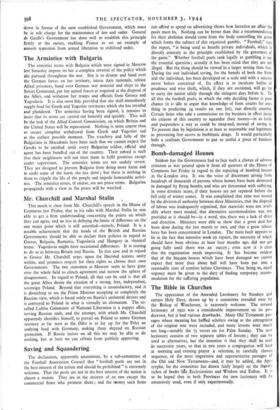Saving and Squandering
The declaration, apparently -unanimous, by a sub-committee of the Football Association Council that " football pools are not in the best interest of the nation and should be prohibited " is extremely welcome. That the pools are not in the best interest of the nation is almost a truism. They are in the interest of no one except the commercial firms who promote them ; and the money such firms
can afford to spend on advertising shows how lucrative an affair the pools must be. Nothing can be better than that a recommendation for their abolition should come from the body controlling the game which forms the subject of this organised gamble. " Football," says the report, " is being used to benefit private individuals, which is directly contrary to the principle established by the governors of the game." Whether football pools rank legally as gambling is not the .essential question ; actually it has been ruled that they are not illegal. But the thing should be viewed'in a larger setting than that. During the war individual saving, for the benefit of both the State and the individual, has been developed on a scale and with a success never before conceived of. Its effect is to inculcate habits of prudence and wise thrift, which, if they are sustained, will go far to carry the nation safely through the stringent days before it. To all this the football pools, in which the only deciding factor is pure chance (it is idle to argue that knowledge of form counts for any- thing in predicting 34 results on one list), run directly counter. Certain firms who take a commission on the business in effect incite the citizens of • this country to squander their money—in as futile and purposeless a way as could be imagined, instead of saving it. To prevent that by legislation is at least as reasonable and legitimate as preventing free access to barbituric drugs. It would particularly befit a. coalition Government to put so useful a piece of business through.


























 Previous page
Previous page